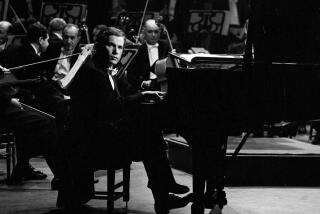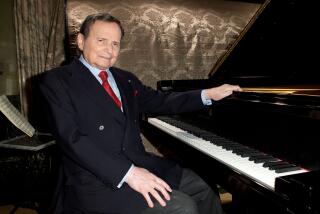Memories of Bernstein: What Lenny means to me, by Joshua Bell, André Watts, Marin Alsop and more
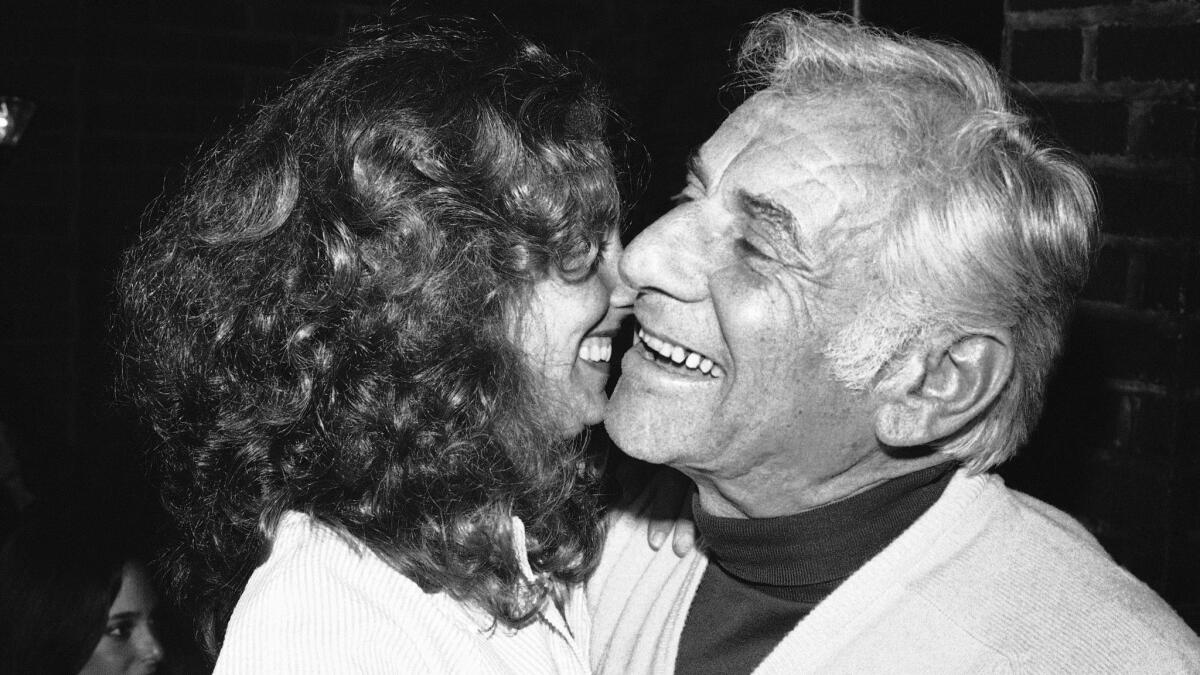
Some wanted to talk about his legacy. Others recalled how he was inspirational or what “Lenny” was like as a person. The president of Bard College celebrated his political and social engagement. Violinist Joshua Bell and pianist Lara Downes cited him as a continuing touchstone.
Leonard Bernstein would have turned 100 years old Saturday, and in honor of the centennial, The Times reached out to the music world — pianist Andre Watts, lyricist Stephen Schwartz, Gustavo Dudamel, James Conlon and more — to share stories about the legendary composer and conductor.
For the record:
4:45 p.m. Aug. 24, 2018An earlier version of this article cited the Oakland East Bay Symphony. The correct name is Oakland Symphony.
After Bernstein died in 1990, a newspaper cartoon showed a flag planted on planet Earth. It simply read: “Leonard Bernstein Lived Here.” If the edited remembrances below are any indication, the man and musician remains as beloved as ever.
Joshua Bell, violinist:
Just as I can not contemplate what my life would be like if I had never heard Bach or Beethoven, I also cannot imagine a world without Leonard Bernstein. He was perhaps the most complete musician of our time. As a conductor, he electrified orchestras and audiences with his huge persona and physical embodiment of the score. As an educator, he had an uncanny ability to analyze and verbally articulate what music was about with clarity and elegance. And as a composer, he portrayed the richness of America and its melting pot, while capturing the essence of the human condition in both its glories and imperfections. Although I never had the chance to meet Lenny — one of my great regrets — I am grateful for the precious gifts he gave us, and I continue to be inspired by his spirit, which is very much alive and well 100 years after his birth.
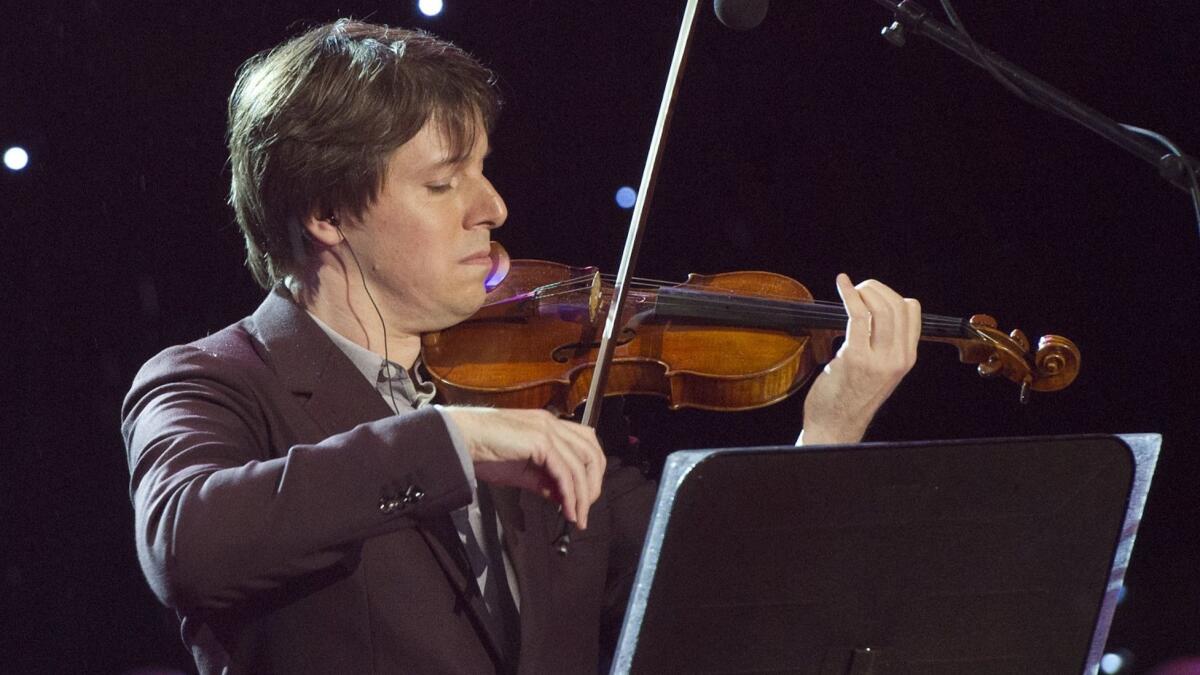
André Watts, pianist:
One of my most treasured experiences with Maestro Bernstein was an incident that gave proof of his total commitment to and immersion in every musical moment.
I played the Liszt E-flat Piano Concerto at a Young People’s Concert in the fall of 1962 and got to substitute for Glenn Gould in January 1963 with the same work. I had heard criticism about Bernstein’s flamboyant, exuberant, uninhibited style, which was often viewed as showboating. The implication of inauthentic calculation was implied in these criticisms.
TIMES CRITIC Mark Swed on why late-career Bernstein matters more than you think »
When I arrived in New York to sub for Gould, Bernstein told me we would be recording the Liszt concerto that Sunday. I had no idea what this entailed. When we came near the end of the allotted recording time, Bernstein said he wanted to record the last four or five minutes of the concerto again. He wanted to try for something different from the orchestra. But we had time for only one more take, so he told me not to stop playing “under any circumstances.”
Less than a minute in, we all suddenly heard someone singing along at the top of his lungs. It was Bernstein! He immediately stopped and said an expletive, laughing along with everyone else.
His enthusiastic desire to get more out of the players was a gift for me on many levels. The biggest thing I understood was that Bernstein’s commitment in performance was completely genuine and unselfconscious. For him, music really was more important than image. It remains an honor to have made music with such a great artist and human being.
Stephen Schwartz, co-lyricist of Bernstein’s ‘Mass’:
Lenny was the closest thing I ever had to a mentor. Although we only worked together on “Mass” for a little over three months (and it seems impossible that so much got done in so short a time), I not only learned things about composition and a multidimensional approach to music, but I also saw how even the most famous musician in the world could treat everyone, from a member of a boy’s choir to an ensemble dancer to the third clarinet player, with respect and appreciation. That was the lesson I’ve most tried to remember throughout my career.”
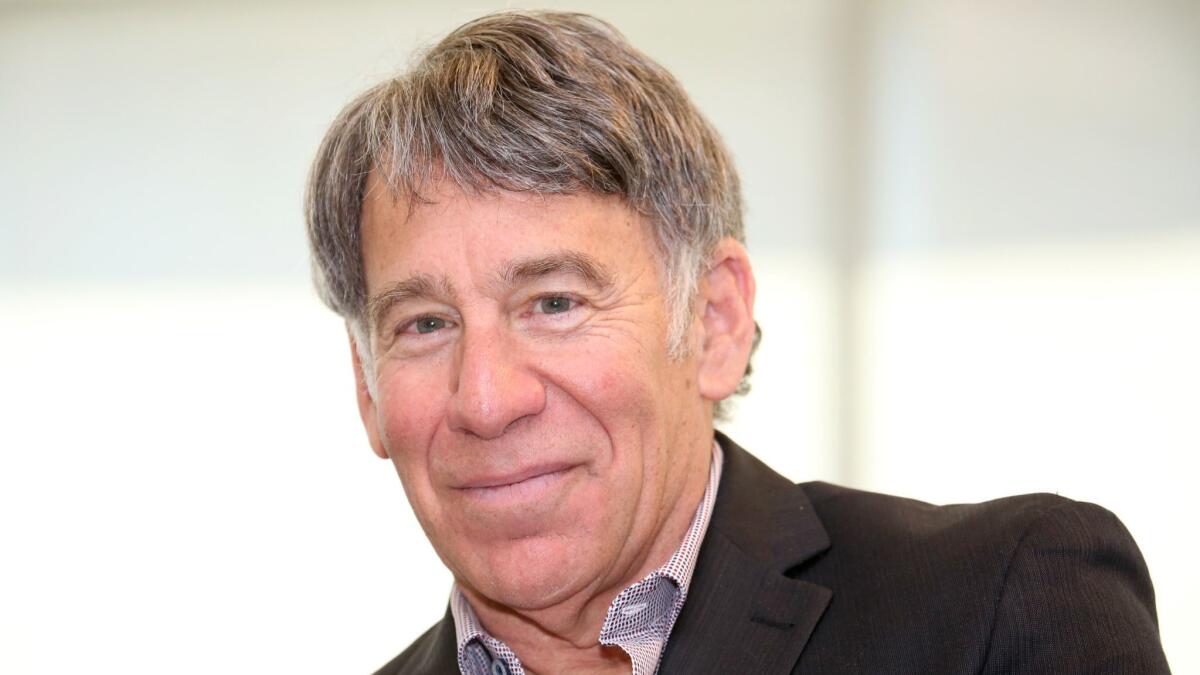
Jamie Bernstein, daughter:
I couldn’t have been more than 12 when I was chatting with my father in his studio up the driveway of our Connecticut house, and he said, “You know what’s marvelous? You know how to treasure your experience.”
Treasure my experience? I had no idea what he was talking about.
Writing “Famous Father Girl: A Memoir of Growing Up Bernstein” turned out to be a way of pulling my father closer to myself, at the very moment when he is being most intensely shared with the world. It’s a bit of a conundrum, to have drawn him closer while simultaneously sharing that experience with others. But it did feel good to go back in my mind — and my brother’s and sister’s minds, as well — and gather all the memories. Maybe that’s what my father meant all those years ago; I have indeed treasured my experience, after all.
James Conlon, music director, Los Angeles Opera:
Having grown up in Bernstein’s New York and watched him raptly in my formative years, I took away many impressions — from broad insights into music to a richer understanding of the repertoire. The greatest lesson that all of his music-making revealed was the power of enthusiasm, conviction, courage and inspiration. He showed that musical works grow and change with time, and that was at the heart of one particularly memorable experience conducting his music. I shared it with his daughter Jamie, who had rewritten the spoken text of the “Kaddish” Symphony. She felt that in the years since the work’s composition, the world had changed, and that to do the work justice, the text needed to reflect that, and that he would have agreed. I’m grateful to have grown up in his era and to have witnessed him and experienced his music.
Michael Morgan, music director, Oakland Symphony:
There are two things I miss most about Bernstein: One was that you were constantly learning around him, whether at a rehearsal, at a concert, or just in even the most casual conversation. It is exceedingly rare to go to a performance of the standard repertory now and learn something about a piece you’ve heard many times before, yet with him it was a regular experience — exhilarating even when you didn’t completely agree with his approach.
The other thing was the extraordinary, all-enveloping love he seemed to have for everything and almost everybody. He showed us that we must take what talents we have and make things better for others. Social justice and art were never for a moment separated. Those of us who learned this from him will spend the rest of our lives trying to live up to that ideal. I think of him constantly.
Shai Wosner, pianist
It was the Vienna Philharmonic’s historic visit to Israel. Leonard Bernstein was conducting Mahler’s 6th Symphony. I was a 12-year-old Mahler nut, sitting with the score in a state of total rapture. This was like the second coming of Gustav, if not Jesus. Naturally, I snuck backstage, to get the Mahler Messiah’s autograph. I got there so fast he hadn’t even come off stage yet.
I was waiting anxiously when I suddenly heard a “shalom” in a deep, raspy voice from around the corner. I told Bernstein that the Mahler was amazing (which it was) and proudly handed my little pocket score for him to sign — cigarette in his mouth the whole time, of course. Amid the smoke, I tried to come up with something smart to say while he was signing, but all I could think of was, “You know, you really should quit smoking ...”
I think his reply was, “Ah, well ...”
Leon Botstein, conductor and president of Bard College:
Watching the YouTube clip of Leonard Bernstein explaining to a network TV audience in 1960 what it means to interpret a musical text (a Bach concerto for keyboard) in a program with Gould, one realizes how utterly astonishing Bernstein was. Never has there been such an eloquent, clear-minded and compassionate voice who believed music was an essential form of life and could bring that belief across to everyone. And to think the spellbinding and charming person on the screen was at the same time a mesmerizing and dynamic conductor, a fabulous pianist and a wildly successful composer.
Bernstein used all his talents — particularly his way with words — to make the classical music tradition vital to Americans. He broke through the artificial barriers of snobbery and resentment that separate concert music, Broadway, jazz and popular music from one another. But the aspect of Bernstein, arguably the 20th century’s most gifted and brilliant American musician, that we miss the most is his political courage — his commitment to a vision of a liberal America.
Bernstein resisted autocracy, discrimination, censorship, injustice and inequality. His patriotism, his love of this country was to its laws, its pluralism, its openness, and to racial justice, the embrace of immigrants and their access to the American dream. Bernstein fought against violence, fear and war. He wanted America to be a beacon of democracy and social justice throughout the world. And those beliefs defined his love of Israel. The best way for musicians to remember Bernstein is to follow in his path and not hide behind the idea that music is a world apart, and to fight for the democratic vision of America Bernstein cherished.
Allen Shawn, author of ‘Leonard Bernstein: An American Musician’:
I grew up in New York in the Bernstein era, watching his young people’s concerts, seeing him conduct, and hearing some of his music. But what I knew of him was filtered through his reputation and through the viewpoints of my teachers. In the many composition classes I took, he was never mentioned as a composer to be taken seriously. And in conversations about him there hovered over him some strange aura of vulgarity and even a taint of his having gone too far in his left-leaning sensibilities and in the famous party he and his wife gave supporting the families of jailed Black Panthers.
It wasn’t until I was asked to write a book about him that I encountered the full range of his compositional output, the breadth and depth of his achievements as a conductor, his important perspectives on music history, or the seriousness and sincerity of the stances he took on political matters. In my research I encountered the almost alarmingly versatile and sometimes self-indulgent Lenny of legend, but also a composer whose work deserves to be seen as a whole, and which is fastidious, authentic, quintessentially American, beautifully crafted, and always musical in every genre; a composer-conductor with a reverence for the text of a score and an almost uncanny ability to identify even with music very far from his own idiom; a brilliant speaker and writer; and a passionate, fearless advocate for human rights. And of course he and Felicia were quite right to give that fund-raising party.
Gustavo Dudamel, music director, Los Angeles Philharmonic:
His greatest legacy is that of sheer talent. It’s breathtaking. And he was equally adept at conducting and composing, as well as his ability to bring the music to people and make it accessible in a way it never was before. And finally, he had a strong and loud voice for the issues of the day. Leonard Bernstein was a man of his times and a man for all time.
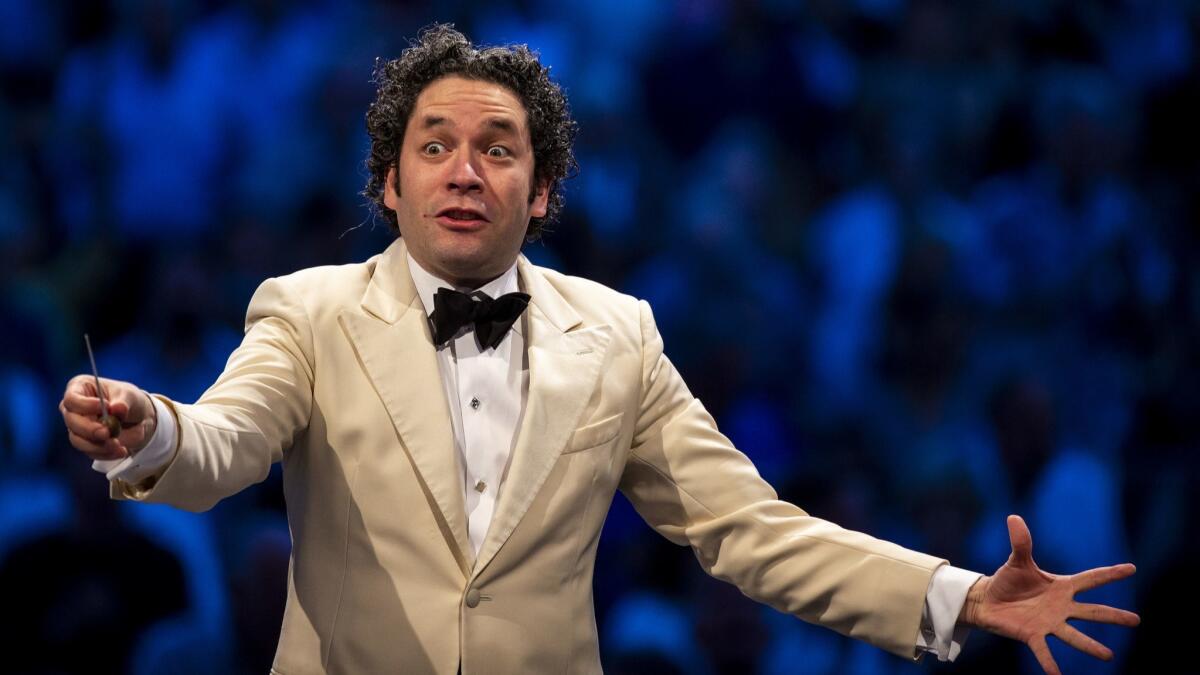
Michael Tilson Thomas, music director, San Francisco Symphony
When I think of Bernstein, I think of something he didn’t have: enough time. He was a man with great ambition as a composer, and with enough performing projects on his mind to fill out a thousand concert seasons.
Yet, I am thankful that he had time for young artists, including me, to whom he introduced the essence of his process of learning, which was basically how to ask the right questions and how to give yourself permission to do something special with the answers, something that means something to you. He asked questions like, “What exactly is happening in these bars? Now right here, Schumann says, ‘Go a little slower.’ Why does he say go slower? Give me five possible reasons. OK! Now, which of those reasons do you believe is right?” In the first such conversation we had, he must have asked 15 questions on every page. Nothing made him happier than when the answer was another question.
This depth of meaning and questioning was something he strove for in his own music. He wanted his pieces to be cryptic, elegant, intellectually impregnable. Yet, he also wanted to connect with people in a direct, visceral way, so the music had to be tuneful, rhythmic, expressive, streetwise. He wanted his music to be a part of people’s lives, whether they’d met him or not, and this he truly achieved.
Lara Downes, pianist:
As a musician who has made my own path and my own rules, much more by instinct than by design, I look to LB as my guide to an adventurous life in music. Throughout his life, he remained an iconoclast and an explorer, fearless of any new territory that invited and excited him. He was driven by fierce curiosity and passion, and by a bone-deep belief that the music mattered, urgently, in his world and his time. He believed — really, truly, impulsively, stubbornly — that the music could heal and unite us, could help us to attain the promise of our democracy and awaken the better angels of our nature. That conviction pushed him to keep trying new things, to reach and teach, succeed and fail, to search within, and to spread the music as far and wide as it could possibly go. The music he made, the life he lived, cleared the path and laid the ground for me, for us, to build on. It’s the foundation for the freedom I feel to follow my curiosity, to explore new terrain, to reach and teach, and to act on my own stubborn belief that in our world, in our time, the music matters.
Phyllis Newman, Tony Award-winning actress and singer:
A big, delicious multi-layered cake was Lenny. I’d like to remember a tiny taste of it. We laughed a lot. We’d often be at a reception after a concert, sometimes to help his glorious wife, Felicia, get through them. At some point I would whisper to Lenny, “a thousand bucks if I can get out of here,” and he would laugh. The night before Lenny died, I was sitting on his bed. When dinner was announced, the other people went in, but I didn’t. Lenny pulled me down and whispered in my ear, “a thousand bucks if I can get out of here.” We laughed together for the last time.
Marin Alsop, music director, Baltimore Symphony Orchestra
What do I miss most about Leonard Bernstein? Everything — well, almost everything. Seeing him conduct when I was 9 years old was the catalyst for me wanting to become a conductor. He was my hero and idol growing up, and he exceeded all of my hopes and expectations when I became his student. He was generous, affectionate, demanding, probing, funny and, above all, passionate about the role of the conductor as the messenger for the composer. He gave me many gifts, but the greatest one was the encouragement to be myself. Watching him lead his life as a true citizen of the world inspired me well beyond music.
He enabled America to become an essential part of the classical music world. As composer, his work is inspiring, timeless, fascinating, challenging and inclusive. It will influence people for many centuries to come. His total embrace of interdisciplinary thinking and learning is ever present in his music and chartered a new path for education.
Jeffrey Kahane, conductor laureate, Los Angeles Chamber Orchestra
It’s impossible to overstate the power of Lenny’s influence on an entire generation of musicians (actually, surely more than one generation). I was one of the many thousands of American kids who watched LB’s people’s concerts in my formative years, and I hung on every word and every musical example that he played or conducted. His passion for teaching and communicating about music left a deep imprint that would inform my own work as a pianist, conductor and educator in so many ways. Few if any musicians in history have ever harnessed such awe-inspiring musical and intellectual powers in the service of reaching the widest possible public, without ever being patronizing or dumbing-down. I’m also eternally grateful to him for having consistently represented the idea of good music knowing no boundaries of genre or “register.” (Among those who have seen it, who can ever forget his amazing demonstration of the Mixolydian mode by playing and singing the Kinks’ “You Really Got Me” for an entranced audience of young listeners?)
I would never have imagined, as a young child who worshiped that charismatic master musician on a black-and-white TV, that roughly two decades later I would join him and my distinguished colleague Neal Stulberg in a performance of the Mozart Triple Concerto at the Hollywood Bowl. His Mozart playing and conducting in 1982 would surely be considered politically incorrect among the staunchest advocates of period performance practice today, but, like everything he did, it brimmed with an elemental force and intelligence. The photos taken at rehearsals and that concert are among my most treasured possessions and have pride of place on my studio wall.
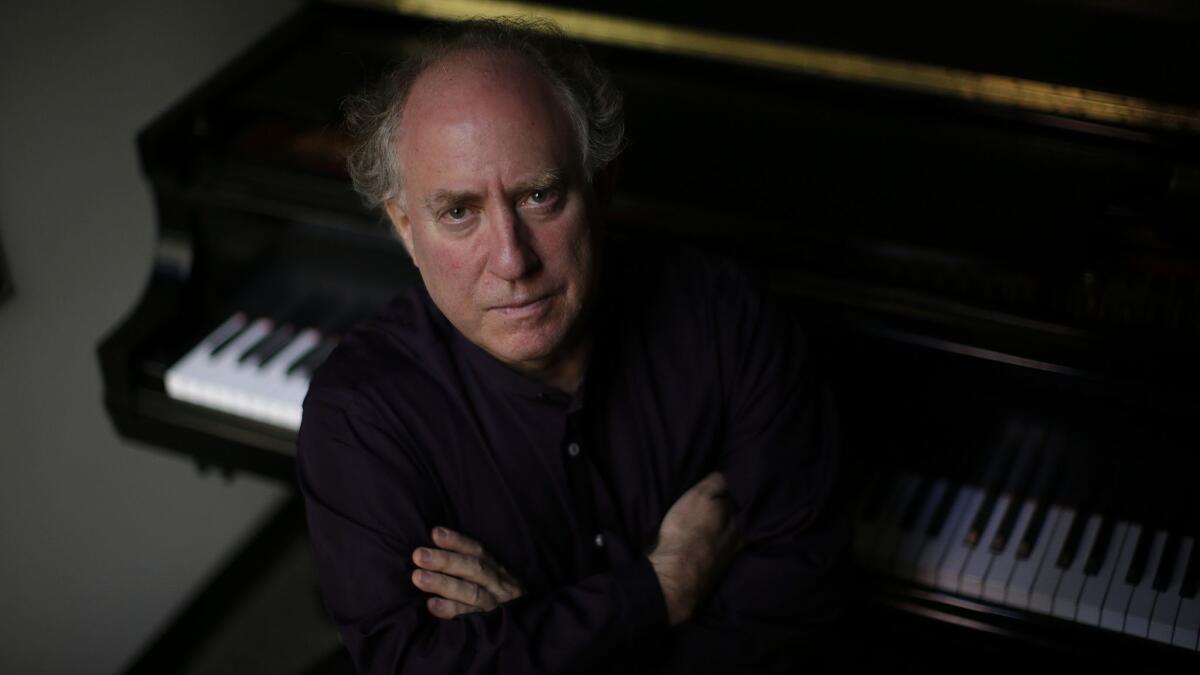
Teddy Abrams, music director, Louisville Orchestra
As a very young musician, Lenny already loomed large and legendary — a person I recognized as an American hero along with JFK, MLK and Lincoln. I chose Bernstein’s “The Joy of Music” for my fifth-grade book report, and every page spoke to me, illuminating the boundless social and artistic potential in sharing music.
Since then, everything I’ve learned about Lenny — from conducting or playing his music on a monthly basis, to reading his recently published letters, or studying his Young People’s Concerts and Norton lectures — has served as a guiding example of what is possible when one leads a life that is as open, curious and creative as the music he made. His music was absolutely honest, so true to his spirit, that even without having met Lenny in person I feel like I can count him as a mentor and a friend. It isn’t hyperbolic to suggest that the world of orchestras (and American music in general) would be far dimmer if it hadn’t been for Bernstein’s pluralism, populism and instinct to engage with virtually anyone. For that reason, we rightly place Bernstein in our venerated musical pantheon, but more important there is a place for Lenny — the music he created and the principles for which he stood — within each future generation of musicians and music-lovers.
Rachel Fine, CEO, Wallis Annenberg Center for the Performing Arts
I adore Leonard Bernstein, who had great influence on my musical education as a young pianist. In fact, early on I developed a passion for American art song — music for voice and piano that is unmistakably American in idiom and in sound — by Bernstein. When I was 16 or 17, I listened incessantly to a recording of Bernstein songs (including “La Bonne Cuisine — Four Recipes” for voice and piano), which had incomparable charm and pizzazz. They could captivate any moody and misanthropic teenager, and inspire — like his Young People’s Concerts — a great love of and appreciation for classical music.
Hershey Felder, playwright who played Bernstein in ‘Maestro’
Over the years I have had the privilege of meeting the Maestro’s immediate family members, business associates, colleagues, students and audiences, and one thing is constant and uncanny. Each had a personal relationship with him. Some shared how brilliant, loving, giving, caring and generous he was; others shared that no one could be more self-serving, arrogant, frustrating, hurtful and mean and a “poser.” But one personal friend of his seemed to capture everything I gathered: “Whatever you say about him — groundbreaking, brilliant, loving, intimate, genius, horrid, mystifying, selfish, arrogant, meshuggah — whatever it is you will say, you’ll be right.”
Carl St.Clair, music director, Pacific Symphony:
It was Thursday, Aug. 16, 1990. Mr. B. was rehearsing his final work, “Arias and Barcarolles,” on the stage of the Shed at Tanglewood. That Sunday would mark the premiere of the orchestrated version by Bright Sheng. At one point, while he was conducting the rhythmically complicated second song, “Love Duet,” Mr. B. gently put his baton down on the music stand and left the stage. We all rushed after him, not knowing what was going on. He went into the green room and in total dejection and frustration plopped down on the couch. “I can’t even conduct my own (expletive) music!”
As always when he conducted the Boston Symphony, I was serving as his assistant. Then, someone suggested I take over conducting the piece. For the concert, this would give Mr. B a long rest between pieces by Britten and Beethoven. I was sitting to his left and I’ll never forget how he looked over at me, and even as sick as he was, in a mock Texas accent said, “Cowboy” — that was his pet name for me — “ya got it in ya?” I said, “Mr. B., whatever you need me to do, I am there for you.” He said, “I’m going home.”
That’s how I came to be entrusted with the premiere of “Arias” on Bernstein’s last concert.
John Mauceri, founding director, Hollywood Bowl Orchestra
In a way, all of us are saying the same thing about Lenny: his laser-like commitment to freedom and understanding, and his belief that music can and does make the world a better place. When I last spent time with him, it was Thursday, Oct. 11, 1990. I sat at the edge of his bed and told him that the Los Angeles Philharmonic was creating a new orchestra for me at the Hollywood Bowl. I remember the look of joy on his face at hearing the news. “Call me on Monday, baby,” was the last thing he said to me.
The funeral was Tuesday, and that afternoon I flew to Los Angeles for the press conference announcing the creation of the Hollywood Bowl Orchestra. For the next 16 summers, I kept him in my mind — his catholicity of taste, his passion to commit equally to every kind of music and his desire to share in words what he felt about music. That is why I started talking to the audience — something that he invented and I had never done before. He was the inspiration for all of that and continues to be every day of my life as a musician and writer.
See all of our latest arts news and reviews at latimes.com/arts.
More to Read
The biggest entertainment stories
Get our big stories about Hollywood, film, television, music, arts, culture and more right in your inbox as soon as they publish.
You may occasionally receive promotional content from the Los Angeles Times.
